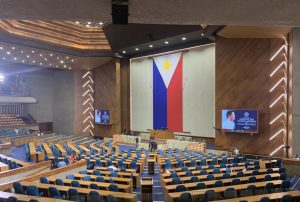Several initiatives promoting the amendment of the 1987 Philippine Constitution have garnered the support of the leadership of both houses of Congress, even if the campaign could further cause political disunity and public dissatisfaction.
There are three ways to change the Constitution: electing delegates in a Constitutional Convention, Congress convening into a Constituent Assembly, and soliciting signatures from voters in support of a People’s Initiative. Apparently, the current Charter Change (ChaCha) bid is serious since all three modes are actively being pursued by various political forces and legislators.
In March 2023, the House of Representatives passed a resolution supporting the election of a Constitutional Convention. Before the end of the year, there were reports of local officials organizing assemblies to get signatures in support of a People’s Initiative. Surprisingly, the Senate President responded this month by filing a resolution calling for the review of the economic provisions of the Constitution.
All ChaCha attempts have failed in the past because they encountered strong resistance from the people, including members of the Senate. Drafted after the 1986 People Power Revolution, the Constitution contained provisions that reflected the struggle against the dictatorship of Ferdinand Marcos Sr., the father of the country’s current president. For example, the Constitution strengthened the Bill of Rights, empowered Congress to review Martial Law declarations, prohibited foreign bases, and imposed term limits on all elected officials.
Previous ChaCha proponents were mainly politicians and members of the House of Representatives allied with the ruling party. They were accused of trying to remain in power through ChaCha by either removing term limits or adopting a parliamentary government. The latter could mean the abolition of the Senate.
After failing to get public support for ChaCha, recent proposals focused on changing the economic provisions of the Constitution. Specifically, the agenda is supposedly only limited to removing the Constitutional restrictions on foreign ownership of land and corporations. Supporters of “economic ChaCha” blame the Constitution for discouraging the entry of foreign investment, which they insist will bring progress by creating more jobs and livelihoods.
Despite this assurance, the “economic ChaCha” didn’t get the backing of Senators and the public who remained wary about this effort’s real motives and backers. After all, there’s no certainty that the proposed Constituent Assembly or Constitutional Convention will only tackle the economic aspects of the Constitution. Aside from this, laws have been passed in recent years that already allow foreign ownership of public utilities and services.
That is why the proposed resolution of Senate President Juan Miguel Zubiri, which seemingly welcomes the “economic ChaCha,” has alarmed members of the opposition.
Senator Risa Hontiveros, a member of the minority, warned that “the ChaCha journey is treacherous, impractical, divisive, and unwise.” She pointed out in a statement that the campaign “is triggered by multiple hidden agendas, power struggle, and in-group bickering.”
She added: “Why are we attempting to solve our economic problems by creating another problem? Let us not get distracted by the shiny allure of ChaCha, when, beneath all the gloss, it will only trap us in a never-ending cycle of political maneuvering.”
But House Speaker Ferdinand Martin Romualdez, the first cousin of the president, welcomed the Senate resolution while acknowledging that ChaCha is a “sensitive endeavor.”
He said in a media statement: “The synergy between the Senate and the House in passing this Resolution will send a strong signal of unity and purpose. It aligns with the aspirations of the proponents of the ongoing People’s Initiative, who have tirelessly advocated for constitutional reform.”
What Romualdez didn’t mention was the recent allegations that public funds were used to “bribe” people into signing the proposed People’s Initiative. Even the president’s sister, Senator Imee Marcos, publicly condemned the reported use of government subsidies to hoodwink voters into supporting ChaCha.
The children of former President Rodrigo Duterte also issued statements rejecting ChaCha. “I am against this people’s initiative as this is not the people’s voice but the voice of a few who wanted to perpetuate themselves in power,” said Davao Congressman Paolo Duterte. Vice President Sarah Duterte also released her statement against ChaCha. The two Dutertes should be reminded, however, that federalism through ChaCha was advocated when their father was still the country’s president. Their statements reveal the continuing rift between their side and Speaker Romualdez and the growing disunity within the ruling coalition.
The strongest challenge against ChaCha was expressed by Catholic leaders who advised their parishioners not to sign any form supporting the People’s Initiative. A bigger and broader movement against ChaCha could also develop in the next few weeks as the nation prepares to mark the People Power anniversary on February 25.
Legislators, including the Senate leadership, have agreed to support the “economic ChaCha” which means this was done with the support of President Marcos. At the minimum, ChaCha could energize debates about the roots of the country’s underdevelopment and whether allowing foreigners to acquire more assets and a greater role in the economy will spur progress. But ChaCha could also inflame acrimonious rhetoric, exacerbate political differences, and even ignite destabilization. Can Marcos and his government afford to take this risk amid rising global tensions and regional instability?

































